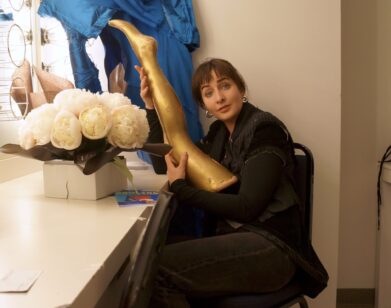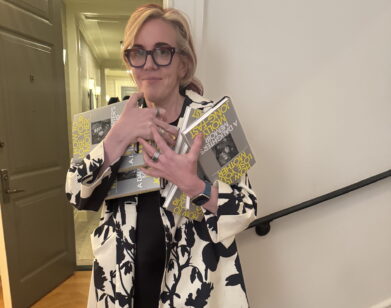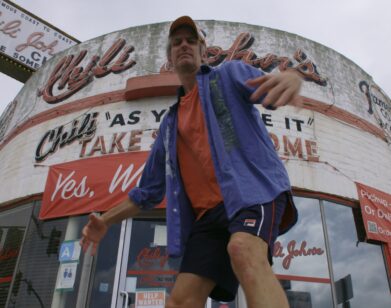Claire Danes
They had written Carrie as bipolar without even knowing it . . . At first, I was concerned that it would just be a gimmick. I still am because it’s fun to see crazy Carrie. CLAIRE DANES
Poor Carrie Mathison. When we left her at the end of Season Two, she was dropping off Brody—the man who she believed she loved and just hours earlier was prepared to run away with—in the middle of the night at the side of a dark road. But now he was the prime suspect in the bombing at Langley, and she, of all people—the one who believed he was a terrorist all along—was helping him escape. Things, though, did not get better from there: As Season Three opened, Carrie was spinning wildly off her meds as everyone at the agency—including Saul—had hung her out to dry. She was getting raked over the coals during the senate hearings, someone was leaking information about her relationship with Brody to the press, and everyone was trying to quash her theory that Brody wasn’t behind the attack and that they needed to be looking for the real terrorists as the desperate rants of a mentally ill woman … And then they had her committed.
Not so poor Claire Danes, though: She has now won a pair of Golden Globes and two straight Emmys for playing Carrie on the Showtime series Homeland, and it seems like with each one of Carrie’s misfortunes, she is given an opportunity to demonstrate her command of a different set of muscles as an actress. The role on Homeland has been a boon for Danes, and it’s easy to see why: As far as TV dramas are concerned, Homeland is heavy, athletic stuff. Carrie, a counterterrorism operative for the CIA who we learn early on is bipolar, spends much of the show’s first two seasons wrestling with both her condition and her boss and mentor, Saul Berenson (Mandy Patinkin), in her pursuit of recently liberated P.O.W. turned congressman Nicholas Brody (Damian Lewis), whom she suspects—it turns out rightly—of having become radicalized while he was in captivity. Carrie’s obsessiveness often leads her to see things that other people don’t see (which makes her an asset to the agency), but it also drives her—especially when she goes off her meds—to go wildly overboard in her quest to reveal the truth about them (which also renders her a liability). It is, of course, compelling material for an actor to play, but it’s also riveting to watch, a spy-games thriller that—because of Carrie’s erratic highs and lows—beats along at the unnerving pace of a horror movie.
Of course, for some—in fact, many—Danes will always be 15-year-old Angela Chase, the Manic-Panicked protagonist of the confessional/existential cult mid-’90s coming-of-age series My So-Called Life, who openly questioned every aspect of the adulthood and the world that she was being prepared for, as well as the kind of person that she herself was becoming, as she endlessly pined for lone wolf Jordan Catalano. (Sample dialog: “I thought at least by the age of 15 I’d have a love life, but I don’t even have a like life.”) Despite a valiant write-in campaign to save it, My So-Called Life was canceled after just one season, but the small, dedicated following it gathered in that time helped make it a core text in the canon of late-20th-century teen-girldom. In the process, it also transformed Danes into an icon of sorts—somewhere on the spectrum between Winona Ryder and Molly Ringwald—a status cemented when she subsequently starred in another touchstone of the era, Baz Luhrmann’s 1996 alt-rock retelling of Romeo + Juliet, in which she played lovelorn Capulet to Leonardo DiCaprio‘s doomed Montague.
Danes, though, is now 34, married (to actor Hugh Dancy), and a new mother to boot (to their 10-month-old son, Cyrus). And while the associations with characters that she played when she was younger remain unavoidable—and the kind of thing that a lot of actors might roll their eyes at or run away from if they were in a similar position—Danes does neither. In fact, the degree to which a large segment of the audience empathizes with Carrie on Homeland is likely amplified by the way that they are used to relating to Danes on screen, conditioned to see the world through her eyes and search for oceans of subtext that seem to lurk beneath the surface. (One final note on My So-Called Life: If Homeland takes place in the present, then Carrie Mathison is probably around the same age that Angela Chase would be now, which means that Carrie would have been in high school when My So-Called Life began airing during its initial run. If Carrie hasn’t seen My So-Called Life, then all evidence of her predilection for introspection and penchant for getting involved with unavailable men would indicate that she should—or, at the very last, someone should get a set of the DVDs for Brody’s daughter Dana.)
Danes grew up in downtown New York and still makes her home there, while also splitting time between Charlotte, North Carolina, where she shoots Homeland, and Toronto, when Dancy’s own series, Hannibal, is in production. She first met Dustin Hoffman a few years ago through a friend over burgers and drinks at the Chateau Marmont in Los Angeles. She was back there—in town with Dancy and Cyrus for the Emmys—when Hoffman caught up with her for this interview.
DUSTIN HOFFMAN: I have to say, I haven’t always been a television-watcher, but I’m becoming one now because a lot of the art in what we do seems to be happening on TV. You have these extraordinary actors and directors and writers doing these amazing things. I know that you’ve worked in television before, but what has this experience been like for you working on Homeland?
CLAIRE DANES: I’d actually only done one series before Homeland—and I was 14 when I did it, and we only made 19 episodes—so Homeland has really been my first time aging with a character and experiencing her develop and change. I know that this is not an uncommon story, but I got excited again about television from watching The Wire. That show blew me away; I just could not believe how enormous and layered this world was that they’d created, and how deeply I could delve into it. It was just so thrilling to watch a show like that as an audience member that I became interested in getting involved in something like that on the other side, as a performer. But working on Homeland has been very rewarding. I really enjoy the relationship that an actor has with a team of writers on a show like ours. It’s a very intimate process. You really have to work in tandem.
HOFFMAN: In a sense, you’re almost like a co-writer.
DANES: Well, there’s no way that I could spin the kinds of stories that our writers spin—I’m always dazzled by their imaginations. But it becomes a conversation because the writers are writing for you, and you are interpreting what they write, and then they riff on what you’re doing, and on and on it goes. The writers start writing for you, which maybe was more common in film a long time ago, when there were these auteurs who had these communities of actors around them that they built over time and created little cultures around. But there’s something so wonderful about that shorthand, that intimacy, and that kind of an economy that develops. You can do a lot in a very condensed period of time because there’s so much that becomes tacitly understood. After a certain point, you also don’t have to really research because you and the writers have actually developed a history together in real-time. You don’t have to imagine what came before for the character because you’ve actually done a lot of it and worked through it together, which is cool.
MY SO-CALLED LIFE WAS A SEMINAL EXPERIENCE FOR ME. I WAS THE SAME AGE AS THE CHARACTER, AND THERE WAS AN INCREDIBLE SYMMETRY BETWEEN US CLAIRE DANES
HOFFMAN: You know, sometimes when you start on a project, a writer or a director will say, “You’re going to get to the point with this character where you know more than the rest of us do.” But from what I’m hearing from you, it sounds like on a show like this, you, in a sense, become fused with the character.
DANES: You do go through that process, and it still feels new to me to have that kind of authority as an actor on any job. We’ve had a number of directors who have come back and done multiple episodes, but you’re always working with different people, so you, the actor, are the veteran in a way. You play host to all of these different people who come in to direct the show, which is a complete reversal of how things usually work between an actor and a director on a film.
HOFFMAN: It’s interesting to hear you say that you’re working with all of these different directors, because from my perspective, one of the best elements in the texture of the show is the beats that are taken by the actors and the space that you consistently allow each other.
DANES: Well, we actors know each other’s rhythms so intimately now that it’s totally unconscious. When you work together the way we do as much as we do, it becomes cellular, which is such a huge luxury. I know Mandy [Patinkin]’s process—I know his music and how to run and to play with it. It’s such a gift to get to know an actor over this many years—and always in a new context. It’s like being in a marriage.
HOFFMAN: When you got this part of Carrie [Mathison], did you think of her as a character that you had to find?
DANES: Yeah. She seemed completely alien to me—completely other. She still does in some ways, but I’ve spent a lot of time with her now. Because she is so different from who I am, she is that much more enjoyable—and, in some ways, easier—to play. Carrie can be manic. Last season, she was pretty consistently medicated, so there were no episodes where she was really spiraling out, but those scenes are kind of fun to play. In the first season, when she really spun out initially, it was kind of a euphoric mania, and that was interesting because I found that I got a bit of a contact high from it—It was exhausting, but it was also exhilarating. But there are different types of mania. At the beginning of this season we’re in now, she’s a different kind of manic—an agitated manic—and all of those manic scenes just happened to be lumped together in the same couple of days at the very beginning of filming. At the time, I had a 6-month-old son, and I was in a completely antithetical state of being. I had just come out of my mommy cocoon and my cushy, mushy love planet. So entering that mania at that point was not as enjoyable.
HOFFMAN: Did you research bipolar disorder in preparing to play Carrie?
DANES: Yeah, I did—pretty thoroughly. Before we shot the pilot, I read a bunch of books on the subject, and I met with a woman named Julie Fast, who is bipolar and has written about the condition.
HOFFMAN: We know someone who is bipolar, and I was told that when people who are bipolar go off their medication, they very often don’t want to go back on it because going off it is like being on cocaine.
DANES: Yeah, they’re addicted to a particular point on the continuum of mania. My best friend is a therapist and has worked with a lot of bipolar patients. I was lamenting to her the fact that I actually know quite a few people who are bipolar, but they’re so well treated that I couldn’t engage with them when they were actually manic and observe them in that state. Obviously, I was saying that facetiously, but she said, “Well, you know, I have only seen my patients when their mania is becoming unpleasant. I don’t see them in the initial stages of mania, which they call euphoric mania, because there is no way that they are ever going to dull that high by coming to see me. They’re not going to interfere with that state.” She said, “You’re just going to have to extrapolate.” So it’s one thing to read about bipolar disorder, but it’s another thing to experience it or see it firsthand. What I actually did find very useful was that there are so many videos on YouTube of people who are bipolar who I think are just up in the middle of the night and need to talk, so they talk into the camera on their computer. I think a lot of these people are also very eager to share what they’re going through because I’m sure it is quite isolating and scary at times. So I would just binge on these YouTube video diaries that people keep. I had to do a little refresher course on what it was like this season after having had basically the whole second season off from the mania, so I started watching videos again. That has been really the most helpful thing because I can find people on a particular frequency and see how they’re moving and speaking.
HOFFMAN: And actually see them on their highs.
DANES: You can actually see them on their highs. But, again, there are so many different shades of it and each case is specific. I can have plenty of poetic license because there is no one blanket expression of it. I have a lot of compassion for people who wrestle with these kinds of conditions and disorders. I think there are certain virtues that it offers—and certain insights and advantages even. But it can also be very dangerous, and it takes a tremendous amount of maintenance and upkeep and self-examination in order to stay engaged in life and healthy.
he was asking me to give various expressions. At one point, he said, “Be sexy.” So I gave him my 15-year-old idea of what that was. He was like, “Um … No.” CLAIRE DANES
HOFFMAN: I’m assuming that Carrie’s bipolarity was written into the character originally, before you started shooting. Was it?
DANES: They started to find it more as we were going along. I mean, in the beginning, they had just written the pilot, and, obviously, we didn’t know if the show was going to be picked up. I actually think it was a suggestion that came from Showtime because Carrie was already a fairly exaggerated, edgy person. I think [executive producer] Alex Gansa has said that they had kind of written Carrie as bipolar without even knowing it, and then they found the diagnosis.
HOFFMAN: Oh, that’s interesting.
DANES: Yeah. At first, I was concerned that it would just be a gimmick. I still am. I’m always anxious about it because it’s fun to see crazy Carrie. She’s exciting, you know? And this is entertainment—there’s no way we could see what goes into just the everyday slog for her of remaining afloat.
HOFFMAN: Nevertheless, one of the things that makes Homeland so compelling is that none of the characters are just CIA agents; they’re also human beings who are lonely or work too hard, and that’s where we find our sameness. There’s that one episode in the first season, where Carrie has completely lost it and is putting things on the wall and getting them all in order and figuring out that her suspicions about Brody are true, but her bosses at the CIA are not allowing her to do it—even though she knows that she’s right. Watching that episode, all I could think of was, “I wonder if that has ever happened to Claire when she was working.” In other words, I was wondering if you’ve ever been working with a director or a writer who won’t let you do something, but you know you’re right and that whatever you’re working on is not going to be anywhere near what it could have been if they had just allowed you your freedom. Have you ever lost it like that? I’ve lost it like that making movies.
DANES: Yeah, I have, too.
HOFFMAN: It’s a horrible feeling.
DANES: It is. But Carrie is different in the sense that, for all of her erraticism, she is always like that. There is that constant truth.
HOFFMAN: Well, she’s intuitive.
DANES: She is intuitive, and it’s the paradox of the show that she’s in a clandestine service and in a world of evasion and indirectness and secrecy, but she herself is an incredibly candid, honest, rigorous person. I mean, it’s preposterous at times, but it’s fun because the stakes are always so impossibly high. It’s like jumping on a trampoline—there’s just a lot going on—and those scenes give you a lot of power and license to go wherever you need to go. We have set our own rules, though, as far as what we will do and won’t do, and we’re very careful about them. We know where the lines are and we don’t want to stray too far outside of them.
HOFFMAN: You know the tone.
DANES: We know the tone.
HOFFMAN: What’s the routine like on Homeland? How does it work?
DANES: It’s pretty regimented. We have a read-through of each episode, which I find really valuable. Usually, it’s at lunch, and it helps me get a sense of what the episode is in its totality because then it’s broken down so quickly and every actor kind of retreats into their respective storylines. So we have a read-through. As I was saying, there are directors who come back, but we usually have a different director for every episode, so sometimes I’m working with new people and some days are more stacked than others. It’s eight days an episode, and maybe half of those days will be 12- to 15-hour days.
HOFFMAN: That’s not a lot of days to shoot an episode of a show like that.
DANES: No, it’s not. I’m just always learning lines. I’ve learned to flag the really crucial scenes, and I start figuring them out and committing them to memory as soon as I get them.
HOFFMAN: So you have a 12- or 15-hour day, then you get home and you have your baby, but you can’t go to bed because you have to learn your lines …
DANES: That’s why I just have to be organized about when I learn them. I do it on my days off, when I’m getting my hair dried … My husband [actor Hugh Dancy] is also on a television show now, so we’re always running lines with each other. We’ll run lines with each other on the phone. I run lines with him in taxicabs. And I have an assistant who helps me and will run lines with me. During the first season, I didn’t have an assistant, so I just ran lines with the script supervisor while I was doing other scenes.
HOFFMAN: So you’ve done this now for three seasons. Is there a point when you envision yourself going, “I can’t do this for another year”?
DANES: I don’t know. I definitely have not come to that, but it is a marathon. I also haven’t played another character since I started on Homeland because I had a baby.
THERE WAS JUST NO SECURITY BEING IN A CLIQUE—I FOUND IT EXHAUSTING. YOU HAD TO BE SUPER-VIGILANT IN ORDER to MAINTAIN YOUR STATUS as SOMEBODY WHO WAS WORTH ADMIRING. CLAIRE DANES
HOFFMAN: Otherwise, you’d be working on the show about six months a year and could maybe do a movie in between seasons?
DANES: Yeah, that was the idea. I mean, that’s the real luxury and allure of cable: that you have time to invest in other projects. My project over the last couple of years has been creating a family, which has been great but very involving. So I would really like to play another character to deviate from Carrie for a second just because I’m starting to think that acting is this, and while this is one of the most fulfilling expressions of acting that I’ve found, it’s not why I do it. It’s not it. I think I’d appreciate her even more if I could take a little vacation from her and inhabit somebody else for a while.
HOFFMAN: The magazine sent me some articles about you, and there is one older story where you’re very young and there are these pictures of you against a wall. I can’t tell if you’re pretending to shoot a gun with your fingers, but it’s a very impish moment. When I saw those pictures, I thought, “Oh, there’s a little Feydeau in her. She can do French farce.”
DANES: Do you know what? That story was from Interview [January 1995]. I was 15, and Spike Jonze actually took those photos. It was so fun. I didn’t know who he was at that point. I don’t think he was even a director yet—he was primarily a photographer. But I remember he was asking me to give various expressions. At one point, he said, “Be sexy.” So I gave him my 15-year-old idea of what that was. He was like, “Um … No.” [both laugh] I didn’t know how to give that—I hadn’t had it yet, so I didn’t know what it was. But I do remember that moment.
HOFFMAN: I know that you’ve had a very different life from my own because you got into dancing and acting and starting working very early on. But after you’d already started to work, you stopped for a few years and went to Yale and studied political science and art and psychology. Was there ever a point where you actually thought that you might do something other than acting or performing?
DANES: I allowed myself to consider that possibility in a fairly serious way. By the time I went to Yale, I’d been acting for a long time and I was really tired of it. I was restless—and a little bored—and I was really eager to investigate different parts of myself. I didn’t act for three years, which is a long time—and it was strange when I did return to it.
HOFFMAN: How old were you when you stopped?
DANES: I guess I stopped acting when I was 18 and didn’t pick it up again until I was 21. That wasn’t the plan, though. When I first started at Yale, the plan was to do a movie each summer. But I’d kind of forgotten just how much work goes into getting work, and because school was so demanding, I wasn’t available to read a lot of scripts or take a lot of meetings. Our business is also so erratic. Start dates for movies would be pushed. They’d be meant to go in July but get pushed to September, at which point I’d have to take a semester off if I wanted to do them. So it was frustrating, and it ended up that I just didn’t act during that time. It wasn’t exactly by design, but it ended up being the case, and when I finally came back to acting, I saw it so differently. Suddenly, it just seemed unavailable to me—and incredible that anyone could do it—which was a very strange vantage point to have because I’d been acting for so long before I went to school. Then, once I did finally get another job, I ended up approaching it as a student in this really academic, analytical way. I would think about the character like I was writing an essay or something, which was just all wrong. I had to find a way to turn that part of my brain off and remember that there was analysis involved, but basically, acting is an intuitive, visceral exercise. I had to relearn that.
HOFFMAN: Were there parts that you wanted and didn’t get for whatever reason?
DANES: There were lots of those. There were periods, especially around that time, when I wasn’t working much at all.
HOFFMAN: Did you find that disabling?
DANES: Well, there was a funny time for me even later than that, after I did Temple Grandin [Mick Jackson’s 2010 HBO movie about the life of animal researcher Temple Grandin, who was thought to have brain damage as a child and was later diagnosed with autism—a condition she has successfully negotiated in becoming an expert on animal behavior authoring numerous books on the subject and on her life; Danes won a Golden Globe and an Emmy for her portrayal of Grandin in the film]. That was a big job for me—it was a big experience. I’d never stretched myself to that degree. I was hugely energized by it—and just eager to continue—but I couldn’t find an appropriate project for me to do that on, which was really hard.
HOFFMAN: Your work in Temple Grandin was incredibly rich. You know, I actually met Temple Grandin, the woman, years ago—I had lunch with her when I was researching [Rain Man,1988].
DANES: Oh, right! Of course!
HOFFMAN: It was interesting because I don’t know if you came up against the same thing I did, but when I was doing my research, the so-called autism specialists were split on her. Some of them felt that she wasn’t actually autistic, because autistic people can’t write books about themselves like she did. But I had lunch with her. I remember that she was extraordinarily involved in cages or pens for animals or something, but I’d never had a meeting before with anybody like her. So when I saw what you did in the film, I thought, “Claire had to have met her.” Did you have an opportunity to meet her?
DANES: Yes, I did. I spent a day with her. I read her books, too.
I MEAN, IT’S PREPOSTEROUS at TIMES, BUT IT’S FUN BECAUSE THE STAKES ARE ALWAYS so IMPOSSIBLY HIGH . . . IT’S LIKE JUMPING ON A TRAMPOLINE—THERE’S JUST a LOT GOING ON. CLAIRE DANES
HOFFMAN: Obviously, there was no YouTube when I was doing my research, so you had to go to people’s houses or go to a hospital to meet them, and through that process, I encountered all of these other mental illness and disorders as well. In meeting all of these people, I did come away with a feeling that so many of them in some way knew they were trapped by these illnesses and disorders. So many of them seemed to have an awareness of what they were up against.
DANES: Well, I’ve talked about this before, but I was expecting the experience of playing Temple Grandin to be much lonelier than it actually ended up being. Her interests are so enthralling to her. She is genuinely turned on by these ideas that she has. She loves animals—she’s just riveted by them. She also has a great sense of humor, and I think she really enjoys her life and all of these things fill her up. I was a bit taken aback by that. I mean, she has obviously been very candid about her struggles. She has experienced an enormous amount of pain. But she has also been able to identify her conflicts and find solutions to these problems. That’s partly what her condition offers her, too—that impulse to problem-solve. You know, I’ve thought a lot at this point about what it is to be autistic and what it is to be bipolar, and, of course, I’ve wondered which is tougher. I actually think in some ways that it might be more challenging to be bipolar because it’s so mercurial—it’s so ever-changing. You can’t get any traction. You can’t build on a system. Whereas, somebody who has Asperger’s, which is certainly a much more forgiving expression of autism, can create models for coping and build on them over time. But with the bipolarity, you make progress and then it just disintegrates and you have to start from scratch. That can be very challenging.
HOFFMAN: Obviously, you’ve been working for a long time now. I’m sure this has happened to you, where you’re watching TV, changing channels, and then suddenly there is your face, right in front of you, in some film you did. When that happens to me, I’ll usually watch the scene when I just stumble on it, and there hasn’t been an occasion when I haven’t said to myself, “Shit, I wish I could do that over again. I did too much here or not enough there …” Do you ever have that experience?
DANES: Oh, god, yeah—always, always. It’s kind of fun to watch My So-Called Life when it comes on, though. There are only 19 episodes, which actually seems like a lot now that I do 12 episodes a season on Homeland. But it was a strange, cult thing where we didn’t even do a full season, but the episodes that we did do got picked up and were rerun by a bunch of different cable networks, so the show was on for years and years and years—and was discovered by different generations, which was extraordinary. I guess I knew it was special back then, too, but it was my first big gig, so I had no sense of context. But I became close with a lot of people involved—and I am still. It was a seminal experience for me, both professionally and personally. The writer of the show, Winnie Holzman, is still a very dear friend of mine. She’s kind of my mentor—my fairy godmother, I call her. But that was wild because I was the same age as the character, and there was an incredible symmetry between us—unlike Carrie Mathison, who in no way resembles me. I would be the worst case officer on the planet. I am so ill suited to Carrie’s vocation. But Angela Chase was just another high school student.
HOFFMAN: How were your own teenage years different from your character’s on My So-Called Life?
DANES: Well, I was not at all in school—I ran away from school. I had a really hard time in school. Angela Chase was having hard time, too, but she just didn’t have this out that I did-this acting career. She was also a kid of the suburbs, and I grew up in SoHo in the 1980s with these artist parents, so I think that she was probably in a slightly more conservative environment. But every teenager feels singularly wayward and misunderstood. I mean, that’s what it is to be a teenager.
HOFFMAN: You have one sibling?
DANES: I have one sibling, yeah—my brother, Asa, who is seven years older and a lawyer in New York. But because he was so much older, it was almost like we had different childhoods. I think that my parents had changed a lot in the intervening years between when he was born and when I was born. I think that we each probably had very different times as young children.
HOFFMAN: Were you a good student?
DANES: I was a good student. I was a nerd. I liked learning in school—I just didn’t like a lot of the social politics. I was not great at them. I found them pretty tedious and a little scary.
HOFFMAN: Were you an outsider? Or were you a member of the popular club?
DANES: I was kind of both at different points. I was in the “in” club at one point, and I was absolutely not at another, and both periods were fairly hellish. There was just no security being in a clique—I found it exhausting. You had to be super-vigilant in order to maintain your status as somebody who was worth admiring, and the rules were just so intricate and so strict. I just didn’t have the patience for it. I was really that obnoxious kid who always had her hand up and was desperate to scream out the answer in class. I was irritating that way. My best friend since the age of 9—the one who became a therapist—would only allow herself to raise her hand three times per class. She had a quota and a system. But I didn’t. I thought everybody would think it was awesome that you knew a lot of the answers and that you wanted to be involved academically. But it turns out that in junior-high, nobody is that impressed by that. [laughs]
HOFFMAN: I know that you like to read. Is there a particular writer whose work has stayed with you?
DANES: Well, I love F. Scott Fitzgerald and Christopher Isherwood. I also love Lorrie Moore. Do you know her work?
HOFFMAN: I do. I actually called her years ago and asked her to write a screenplay—which she did—but I could never get it made.
DANES: Oh, wow.
HOFFMAN: I didn’t actually meet her until recently. But she’s a wonderful writer. I’m so glad that you know and like her work.
DANES: I do.
HOFFMAN: What has surprised you most about motherhood so far?
DANES: That it’s physical—that my missing my son is physical. It’s a new kind of pining. It’s serious—I need to be with him.
HOFFMAN: I know what you’re saying. My wife has that. You go into a kind of withdrawal.
DANES: I guess it’s closest to being infatuated with a lover or something. But it’s not that. It’s cellular. So, yeah, that the love for your child is physical was a big surprise. I can’t not look at him if he’s anywhere nearby, because there’s no competition. I can’t read. I can’t watch a show. I can’t do anything but stare at him doing nothing. It is amazing how rapidly he changes. I swear, a day passes and he is different. I mean, he produced four teeth in about three days. He understands the concept no now. He didn’t know that two days ago.
DUSTIN HOFFMAN IS AN ACADEMY AWARD-WINNING ACTOR WITH AN EXTENSIVE FILM, TV, AND THEATER CAREER STRETCHING BACK TO THE EARLY 1960S. HE WILL SOON BE SEEN IN JON FAVREAU’S CHEF AND IN THE FILM OF ADAPTATION OF ROALD DAHL’S ESIO TROT, SET TO BEGIN FILMING IN THE SPRING.







